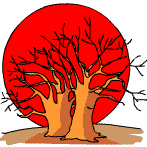The Baobab Tree
Created | Updated Jul 23, 2018

Adansonia digitata, or Baobab tree, was named in honour of Michel Adanson, the naturalist who first saw it in Senegal, Africa about 1750.
The Baobab tree is a strange looking tree that grows in low-lying areas in Africa and Australia. It can grow to enormous sizes and carbon dating indicates that they may live to be 3,000 years old. One ancient hollow Baobab tree in Zimbabwe is so large that up to 40 people can shelter inside its trunk. Various Baobabs have been used as a shop, a prison, a house, a storage barn and a bus shelter.
When bare of leaves, the spreading branches of the Baobab look like roots sticking up into the air, rather as if it had been planted upside-down. The African bushman has a legend that tells of the god Thora. He took a dislike to the Baobab growing in his garden, so he threw it out over the wall of Paradise on to Earth below, and although the tree landed upside-down it continued to grow. The tree is certainly very different from any other. The trunk is smooth and shiny, not at all like the bark of other trees, and it is pinkish grey or sometimes copper coloured.
The Baobab tree has large whitish flowers which open at night. The fruit, which grows up to a foot long, contains tartaric acid and vitamin C and can either be sucked, or soaked in water to make a refreshing drink. They can also be roasted and ground up to make a coffee-like drink. The fruit is not the only part of the Baobab that can be used. The bark is pounded to make rope, mats, baskets, paper and cloth; the leaves can be boiled and eaten, and glue can be made from the pollen.
It is not surprising that such a strange looking tree should have superstitions linked to it. Some people believe that if you pick a flower from a Baobab tree you will be eaten by a lion, but if you drink water in which a Baobab's seeds have been soaked you will be safe from crocodile attack.
Baobabs are very difficult to kill, they can be burnt, or stripped of their bark, and they will just form new bark and carry on growing. When they do die, they simply rot from the inside and suddenly collapse, leaving a heap of fibres, which makes many people think that they don't die at all, but simply disappear.
An old Baobab tree can create its own ecosystem, as it supports the life of countless creatures, from the largest of mammals to the thousands of tiny creatures scurrying in and out of its crevices. Birds nest in its branches; baboons devour the fruit; bush babies and fruit bats drink the nectar and pollinate the flowers, and elephants have been known to chop down and consume a whole tree.
A Baby Baobab tree looks very different from its adult form and this is why the Bushmen believe that it doesn't grow like other trees, but suddenly crashes to the ground with a thump, fully grown, and then one day simply disappears. No wonder they are thought of as magic trees.
Baobabs, grown from seed, are a popular choice for cultivation as bonsai plants.

